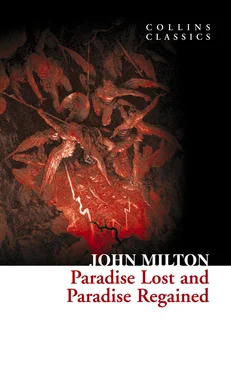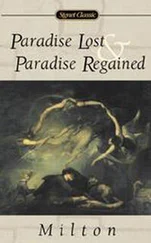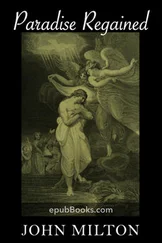Thick as autumnal leaves that strow the brooks
In Vallombrosa, where th’ Etrurian shades
High over-arched embower; or scattered sedge
Afloat, when with fierce winds Orion armed
Hath vexed the Red-Sea coast, whose waves o’erthrew
Busiris and his Memphian chivalry,
While with perfidious hatred they pursued
The sojourners of Goshen, who beheld
From the safe shore their floating carcases
And broken chariot-wheels. So thick bestrown,
Abject and lost, lay these, covering the flood,
Under amazement of their hideous change.
He called so loud that all the hollow deep
Of Hell resounded:—“Princes, Potentates,
Warriors, the Flower of Heaven—once yours; now lost,
If such astonishment as this can seize
Eternal Spirits! Or have ye chosen this place
After the toil of battle to repose
Your wearied virtue, for the ease you find
To slumber here, as in the vales of Heaven?
Or in this abject posture have ye sworn
To adore the Conqueror, who now beholds
Cherub and Seraph rolling in the flood
With scattered arms and ensigns, till anon
His swift pursuers from Heaven-gates discern
Th’ advantage, and, descending, tread us down
Thus drooping, or with linked thunderbolts
Transfix us to the bottom of this gulf?
Awake, arise, or be for ever fallen!”
They heard, and were abashed, and up they sprung
Upon the wing, as when men wont to watch
On duty, sleeping found by whom they dread,
Rouse and bestir themselves ere well awake.
Nor did they not perceive the evil plight
In which they were, or the fierce pains not feel;
Yet to their General’s voice they soon obeyed
Innumerable. As when the potent rod
Of Amram’s son, in Egypt’s evil day,
Waved round the coast, up-called a pitchy cloud
Of locusts, warping on the eastern wind,
That o’er the realm of impious Pharaoh hung
Like Night, and darkened all the land of Nile;
So numberless were those bad Angels seen
Hovering on wing under the cope of Hell,
‘Twixt upper, nether, and surrounding fires;
Till, as a signal given, th’ uplifted spear
Of their great Sultan waving to direct
Their course, in even balance down they light
On the firm brimstone, and fill all the plain:
A multitude like which the populous North
Poured never from her frozen loins to pass
Rhene or the Danaw, when her barbarous sons
Came like a deluge on the South, and spread
Beneath Gibraltar to the Libyan sands.
Forthwith, form every squadron and each band,
The heads and leaders thither haste where stood
Their great Commander—godlike Shapes, and Forms
Excelling human; princely Dignities;
And Powers that erst in Heaven sat on thrones,
Though on their names in Heavenly records now
Be no memorial, blotted out and rased
By their rebellion from the Books of Life.
Nor had they yet among the sons of Eve
Got them new names, till, wandering o’er the earth,
Through God’s high sufferance for the trial of man,
By falsities and lies the greatest part
Of mankind they corrupted to forsake
God their Creator, and th’ invisible
Glory of him that made them to transform
Oft to the image of a brute, adorned
With gay religions full of pomp and gold,
And devils to adore for deities:
Then were they known to men by various names,
And various idols through the heathen world.
Say, Muse, their names then known, who first, who last,
Roused from the slumber on that fiery couch,
At their great Emperor’s call, as next in worth
Came singly where he stood on the bare strand,
While the promiscuous crowd stood yet aloof?
The chief were those who, from the pit of Hell
Roaming to seek their prey on Earth, durst fix
Their seats, long after, next the seat of God,
Their altars by his altar, gods adored
Among the nations round, and durst abide
Jehovah thundering out of Sion, throned
Between the Cherubim; yea, often placed
Within his sanctuary itself their shrines,
Abominations; and with cursed things
His holy rites and solemn feasts profaned,
And with their darkness durst affront his light.
First, Moloch, horrid king, besmeared with blood
Of human sacrifice, and parents’ tears;
Though, for the noise of drums and timbrels loud,
Their children’s cries unheard that passed through fire
To his grim idol. Him the Ammonite
Worshiped in Rabba and her watery plain,
In Argob and in Basan, to the stream
Of utmost Arnon. Nor content with such
Audacious neighbourhood, the wisest heart
Of Solomon he led by fraud to build
His temple right against the temple of God
On that opprobrious hill, and made his grove
The pleasant valley of Hinnom, Tophet thence
And black Gehenna called, the type of Hell.
Next Chemos, th’ obscene dread of Moab’s sons,
From Aroer to Nebo and the wild
Of southmost Abarim; in Hesebon
And Horonaim, Seon’s realm, beyond
The flowery dale of Sibma clad with vines,
And Elealè to th’ Asphaltic Pool:
Peor his other name, when he enticed
Israel in Sittim, on their march from Nile,
To do him wanton rites, which cost them woe.
Yet thence his lustful orgies he enlarged
Even to that hill of scandal, by the grove
Of Moloch homicide, lust hard by hate,
Till good Josiah drove them thence to Hell.
With these came they who, from the bordering flood
Of old Euphrates to the brook that parts
Egypt from Syrian ground, had general names
Of Baalim and Ashtaroth—those male,
These feminine. For Spirits, when they please,
Can either sex assume, or both; so soft
And uncompounded is their essence pure,
Not tried or manacled with joint or limb,
Nor founded on the brittle strength of bones,
Like cumbrous flesh; but, in what shape they choose,
Dilated or condensed, bright or obscure,
Can execute their airy purposes,
And works of love or enmity fulfil.
For those the race of Israel oft forsook
Their Living Strength, and unfrequented left
His righteous altar, bowing lowly down
To bestial gods; for which their heads as low
Bowed down in battle, sunk before the spear
Of despicable foes. With these in troop
Came Astoreth, whom the Phoenicians called
Astartè, queen of heaven, with crescent horns;
To whose bright image nightly by the moon
Sidonian virgins paid their vows and songs;
In Sion also not unsung, where stood
Her temple on th’ offensive mountain, built
By that uxorious king whose heart, though large,
Beguiled by fair idolatresses, fell
To idols foul. Thammuz came next behind,
Whose annual wound in Lebanon allured
The Syrian damsels to lament his fate
In amorous ditties all a summer’s day,
While smooth Adonis from his native rock
Ran purple to the sea, supposed with blood
Of Thammuz yearly wounded: the love-tale
Infected Sion’s daughters with like heat,
Whose wanton passions in the sacred porch
Ezekiel saw, when, by the vision led,
His eye surveyed the dark idolatries
Of alienated Judah. Next came one
Who mourned in earnest, when the captive ark
Maimed his brute image, head and hands lopt off,
In his own temple, on the grunsel-edge,
Where he fell flat and shamed his worshippers:
Dagon his name, sea-monster, upward man
And downward fish; yet had his temple high
Reared in Azotus, dreaded through the coast
Of Palestine, in Gath and Ascalon,
Читать дальше












